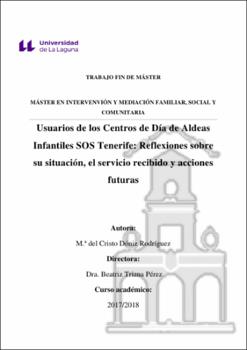Usuarios de los Centros de Día de Aldeas Infantiles SOS Tenerife: Reflexiones sobre su situación, el servicio recibido y acciones futuras
Fecha
2018Resumen
El presente estudio surge de la petición que hace la organización Aldeas Infantiles SOS
Tenerife para conocer la opinión de los usuarios de sus Centros de Día, respecto a sus necesidades y los servicios que les presta, con el fin de sentar las bases de futuras intervenciones. Se
trata, por tanto, de un estudio exploratorio con 30 familias en riesgo psicosocial, que conviven
con hijos adolescentes, usuarias en alguno de los tres Centros de Día que hay en Tenerife (en
Los Realejos, La Laguna y El Tablero). Para la recogida de información se elaboró una entrevista semiestructurada ad hoc, organizada en cuatro bloques de información, partiendo de los
intereses sugeridos por Aldeas Infantiles. Los resultados mayoritarios muestran, en general,
una visión positiva de la relación parento-filial, corroboran los rasgos significativos de las familias en riesgo psicosocial, y revelan la predisposición que tienen las familias para recibir
apoyos en su hogar. Este trabajo ha realizado una aproximación exploratoria al campo de estudio. Con proyección al futuro, se tendrán que realizar estudios más exhaustivos, en los que se
controlen algunos sesgos observados. This study arises from the request that the organization Aldeas Infantiles SOS Tenerife
makes to know the opinion of the users of its Day Centers, with respect to their needs and the
services they have received there, in order to lay the foundations of future interventions. It is
an exploratory study with the participation of 30 families in psychosocial risk, who live together with teenage children, being users of some of three Day Centers that exist in Tenerife
(Los Realejos, La Laguna and El Tablero). To gather information about it, a semiestructured
ad hoc interview was elaborated, organized in four blocks of information, starting from the
interests suggested by Aldeas Infantiles. The main results show, in general, a positive view of
the paternal-filial relationship, they also corroborate the significant features of the families in
psychosocial risk, and they reveal the predisposition that the families have to receive supports
in their homes. This work has realized an exploratory approximation to the field to study. Taking into account a future projection, there will have to be realized more exhaustive studies, in
which some observed biases must be controlled.




